
by Cora Buhlert
So far, this summer has been cold and rainy. Even the cheery tunes of "Liebeskummer lohnt sich nicht" (Heartache does not pay) by Swedish singer Siw Malmkvist, which has been number 1 in Germany for almost as long as it has been raining, can't dispel the summer gloom.
However, rain outside means it's the perfect time to read. And so I was lucky to spot Leigh Brackett's latest in the spinner rack at the local import bookstore. Now a new novel by the queen of space opera, is always a reason to rejoice. And the latest Ace Double offers not one but two new novels by Leigh Brackett.
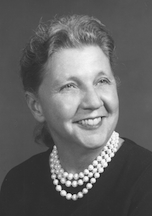 Though upon closer examination The Secret of Sinharat and People of the Talisman are not so new after all, but expansions of two novellas first published as "Queen of the Martian Catacombs" and "Black Amazon of Mars" in Planet Stories in 1949 and 1951 respectively.
Though upon closer examination The Secret of Sinharat and People of the Talisman are not so new after all, but expansions of two novellas first published as "Queen of the Martian Catacombs" and "Black Amazon of Mars" in Planet Stories in 1949 and 1951 respectively.
The two novels are more closely connected than Ace Doubles usually are, because not only are both by the same author, but they also feature the same character, Eric John Stark, intergalactic mercenary and outlaw and hero of several stories by Leigh Brackett.
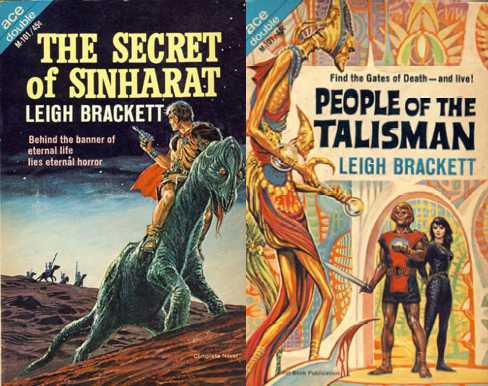
The Wild Man from Mercury
Eric John Stark is a fascinating character. An Earthman born in a mining colony on Mercury, Stark was orphaned as a young child and adopted by natives who named him N'Chaka, the Man Without a Tribe. A few years later, Stark was orphaned a second time, when the tribe that adopted him was exterminated by miners from Earth who wanted the natives' resources for themselves. The miners put Stark in a cage and would have killed him, too, if Stark hadn't been rescued by Simon Ashton, a police officer from Earth. Ashton took the young Stark in and raised him to adulthood.
Though outwardly a civilised man, inside Stark is still N'Chaka, the wild boy from Mercury. There are parallels between Eric John Stark and Edgar Rice Burroughs' Tarzan, who was one of the inspirations for the character according to the foreword by Edmond Hamilton, Leigh Brackett's husband. Eric John Stark is also a black man, something which is sadly still much too rare in our genre. Though you wouldn't know it from the covers, as both Planet Stories cover artist Allan Anderson as well as Ed Emshwiller, covers artist for the Ace Double edition, portray Stark as white.
Stark has little time for human civilisation, but a lot of sympathy for the plight of downtrodden natives throughout the solar system. He involves himself in an endless chain of uprisings and guerrilla campaigns, which are reminiscent both of the Indian wars, which were still within living memory when Brackett was born, as well as the various anticolonial movements currently sweeping through Africa and Asia. Stark's activities as a mercenary and weapons smuggler naturally bring him into conflict with the Terran authorities.
This conflict comes to a head in the opening pages of The Secret of Sinharat, which finds Stark on the run with Terran police officers led by Stark's mentor and surrogate father Simon Ashton in hot pursuit. Stark is facing twenty years in prison due to his role in a failed native uprising on Venus, but Ashton offers him a deal. Kynon, a Martian warlord, is planning to lead the desert tribes into a holy war with the help of off-world mercenaries. If Stark joins Kynon's army as an agent for Ashton, the Terran authorities will forget about Stark's crimes.
I really enjoyed the relationship between Stark and Ashton. Both men clearly have a lot of respect for each other and Ashton is probably the only person in the solar system Stark truly cares about. Ashton also clearly cares about Stark, but is not above using their relationship and Stark's sympathies for barbarian tribes, who – as Ashton reminds him – will suffer most from Kynon's holy war, to get Stark to agree to the deal. I would have loved to see more of Simon Ashton and his past with Stark. Alas, he only appears in the opening chapter, then Stark is on his own.
Martian noir
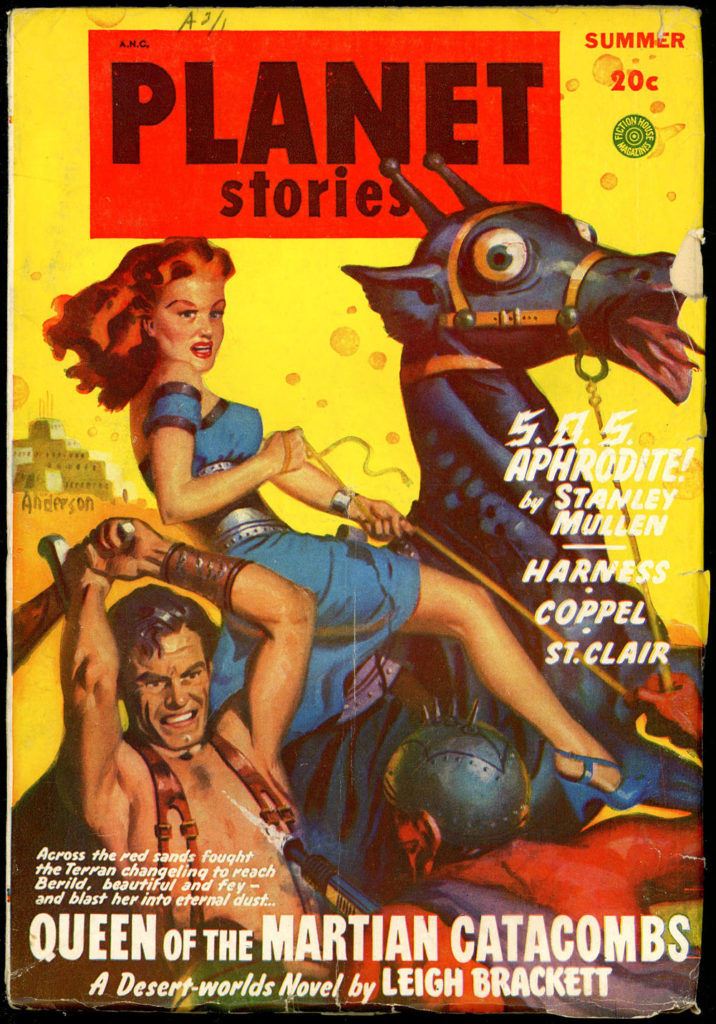
Stark meets with Kynon and steps into a nest of snakes. For starters, Kynon is a fraud who claims to have rediscovered the titular secret, a device which can transfer a person's consciousness into a new body and therefore guarantees eternal life. Kynon is also surrounded by a cast of shady characters who wouldn't seem out of place in the one of the noir movies for which Leigh Brackett wrote the screenplay. There is Delgaun, a Martian gangster, Luhar, a Venusian mercenary and old enemy of Stark's, the Martian femme fatale Berild, who is both Kynon's and Delgaun's lover and seduces Stark as well, and Fianna, Berild's sweet and innocent maid who also takes a shine to Stark. None of these characters are what they seem and all but one will be dead by the end of the novel, either at each other's hands or at Stark's.
The Secret of Sinharat is chockfull of exciting action scenes and atmospheric descriptions of the dying Mars. Stark takes us on a tour of a Martian opium den, survives a deadly sandstorm and a gruelling trek through the blistering desert and explores the ancient city of Sinharat and the mysteries that lurk in its catacombs.
A Strangely Familiar Story
The Secret of Sinharat is a highly entertaining novel, which also seemed oddly familiar, though I knew that I couldn't have read the earlier magazine version. However, I realised that The Secret of Sinharat bore several parallels to a novel I reviewed two months ago for Galactic Journey: The Valley of Creation by Leigh Brackett's husband Edmond Hamilton, the expanded version of a story first published in 1948. The protagonist of both novels is a mercenary recruited to fight someone else's holy war, who realises that he is fighting on the wrong side. Both novels feature ancient technology which can transfer human consciousness into other bodies and both protagonists find themselves subjected to said technology. Both protagonists even share the same first name, Eric.
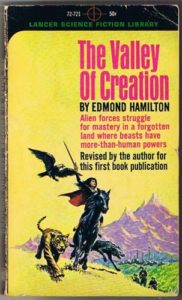 Of course, there are also differences. The Valley of Creation is set on Earth, in a hidden valley in the Himalaya, while The Secret of Sinharat is set on Mars. And Eric John Stark is a much more developed and interesting character than the rather bland Eric Nelson. Nonetheless, the parallels are striking. Edmond Hamilton and Leigh Brackett are not known to collaborate like C.L. Moore and her late husband Henry Kuttner did. But given the similarities of both stories and the fact that they were written around the same time, I wonder whether Brackett and Hamilton did not both write their own version of the same basic idea.
Of course, there are also differences. The Valley of Creation is set on Earth, in a hidden valley in the Himalaya, while The Secret of Sinharat is set on Mars. And Eric John Stark is a much more developed and interesting character than the rather bland Eric Nelson. Nonetheless, the parallels are striking. Edmond Hamilton and Leigh Brackett are not known to collaborate like C.L. Moore and her late husband Henry Kuttner did. But given the similarities of both stories and the fact that they were written around the same time, I wonder whether Brackett and Hamilton did not both write their own version of the same basic idea.
Into the Gates of Death
People of the Talisman, the other novel in this Ace Double, opens with Eric John Stark once again in a fistful of trouble. A dying friend entrusts Stark with the story's plot device, the talisman of Ban Cruach, an ancient king who founded the city of Kushat to guard a mountain pass known as the Gates of Death in the polar regions of Mars. Stark's friend stole the talisman, but now wants to return it, because without the talisman, Kushat and all of Mars are in grave danger.
Stark wants to honour his friend's dying wish. But before he can fulfil his mission, he is captured by raiders who take him to their leader, Lord Ciaran, yet another Martian warlord who wants to unite the tribes and lead them to victory over the decadent cities. Though Lord Ciaran is a much more interesting and memorable character than Kynon from The Secret of Sinharat. Ciaran is the illegitimate child of a Martian king who never acknowledged him. Hungry for revenge and power, Ciaran dresses in black armour, wields a battle axe and always wears a steel mask.
Ciaran wants Stark to join his army, but Stark is wary, probably due to his previous bad experiences with Martian warlords. Of course, Ciaran also wants the talisman and since Stark refuses to hand it over or say where it is, Ciaran has him brutally whipped.
Stark escapes. Half dead, he makes it to Kushat to warn the city of Ciaran's attack, but has a hard time convincing the city guard of the danger. Nor can Stark reveal that he has the talisman, for the rulers of Kushat have kept its disappearance a secret and would kill Stark to preserve it.
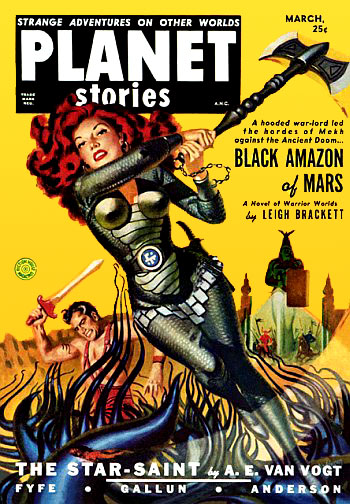
Ciaran Unmasked
Ciaran's forces attack after all and in the pitched battle that follows, Stark faces off against Ciaran himself. Before striking the killing blow, Stark rips off the warlord's mask and gets a surprise that has already been spoiled both by Ed Emshwiller as well as by Allan Anderson on the original Planet Stories cover. For underneath the black mask, the warlord is a striking woman. The unmasking scene is reminiscent of a similar scene in "Black God's Kiss" by C.L. Moore, the story that introduced the swordswoman Jirel of Joiry to the world.
Ciaran is a fabulous character, a strong warrior woman, which is still all too rare in our genre even thirty years after Jirel of Joiry first took off her helmet. Though fascinated by Stark, Ciaran immediately decks him after he has unmasked her. Later, Ciaran tells Stark, "I did not ask for my sex. I will not be bound by it." I suspect Leigh Brackett agrees with her.
Every woman Stark meets in the two novels falls for him and Stark is only too happy to dispense "kisses brutal as blows" (apparently, Simon Ashton's education did not include how to properly treat the other sex). And so Stark falls in lust with Ciaran, even though she had him whipped half to death only days before.
Stark escapes with the talisman and a caravan of refugees through the Gates of Death to seek Ban Cruach's secret with Ciaran and her forces in hot pursuit. A battle ensues in which Ciaran is taken prisoner.
Now the novel takes a sharp turn into Lovecraftian territory. For beyond the Gates of Death lies an ancient city inhabited by alien beings (unlike the humanoid Martians Stark normally deals with). Initially, the aliens claim that they just want to be left in peace. But they quickly show their true colours and attack the humans.
Stark and Ciaran wind up fighting back to back. They escape and Ciaran agrees to leave Kushat alone and conquer the city of her deadbeat father instead. Stark goes with her in what may well be the beginning of a beautiful friendship.
Fiction versus Reality
I thoroughly enjoyed both novels, though they are clearly relics of an earlier age. Leigh Brackett's Mars with its deserts, ancient cities and even older ruins most likely does not exist, just as Mariner 2 revealed that the fog-shrouded Venus with its swamps and oceans that is a staple of pulp science fiction does not exist either. In fact, I suspect that the reason why Ace has not reprinted the third Eric John Stark adventure "Enchantress of Venus" (which I read in German translation a few years ago) is that the red gas ocean of Venus which Brackett described so evocatively is no longer plausible in our brave new age of space exploration.
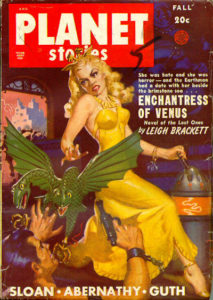
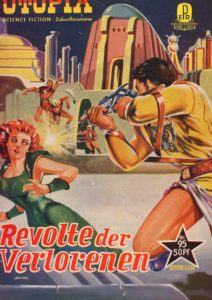
Of course, it is the fate of most science fiction that it will eventually become outdated as science and knowledge march on. But even though we know that the solar system Leigh Brackett described is not plausible, the Eric John Stark stories still remain glorious adventure tales with a protagonist who is a lot more complex than the standard square-jawed heroes of pulp science fiction.
Something everyone can enjoy, rain or shine!

[Come join us at Portal 55, Galactic Journey's real-time lounge! Talk about your favorite SFF, chat with the Traveler and co., relax, sit a spell…]

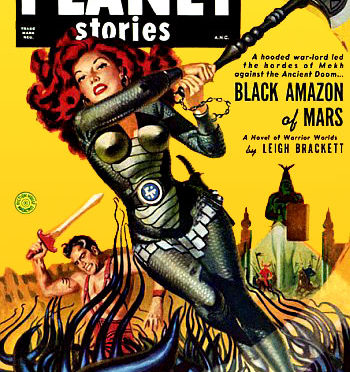


Surely if Ace Books is willing to accept the premise that "our hero grew up wild on Mercury," a livable Venus is a mere dottle?
But I suspect if Leigh Brackett were to revive the Stark series — which would be a wonderful idea — that she'll probably move him out of our boring old solar system altogether, and find a nice new planet for him to have adventures on. Fingers crossed.
A habitable (though barely) Mercury also raised my eyebrows, though growing up on Mercury was probably too linked to Eric John Stark's backstory to remove or at least to relocate his boyhood adventures elsewhere in the solar system. Besides, we know comparatively little about Mercury, so maybe the editors thought it would pass.
Though I agree with you that should Leigh Brackett ever decide to revisit Eric John Stark (and I certainly hope so), relocating him outside our solar system would be the best solution. Ditto for other old style planetary romances.
I also hope that Ace or someone else will eventually reprint Enchantress of Venus, because it's a good story and I enjoyed it a lot, when I read it in German translation.
Someone else did. It's in the GIANT ANTHOLOGY OF SCIENCE FICTION edited by Leo Margulies and Oscar J. Friend (Merlin Press 1954). Finding it, of course, may be a harder proposition.
Thanks for the info, John. Though I suspect that anthology will be as hard to find, if not harder, than the German Utopia Zukunftsroman edition.
Many stories about the nearest planets in the solar system are more fantasy than science fiction, it seems. All of Bradbury's Martian stories, and so on. Nothing wrong with that, of course, as long as we know what it is.
I suspect that older science fiction set in an obsolete solar system like Edgar Rice Burroughs, Ray Bradbury Leigh Brackett, C.L. Moore, etc… will eventually be viewed like fantasy. And indeed, Burroughs and Brackett are more akin to sword and sorcery than to science fiction.
Alas, book covers are meant to sell books, and publishers' art departments don't think black characters on covers will sell. I'm sure 50 years from now, nobody will think twice about it and characters will be able to appear as their authors wrote them.
Peripherally, and possibly only of interest to Cora and I, why are so many of the popular Schlager singers not German? Not just those from other German-speaking countries, but Italians, French, Scandinavians, Brits like Chris Howland and Americans like Bill Ramsey (who I like) or Gus Backus, who was with the Dell-Vikings? Most of them have accents you'd need a chainsaw to get through. It's weird.
I have no idea why so many Schlager stars are not German. There's also Gitte Haenning, the young Danish lady who wants to marry a cowboy. Even Freddy Quinn, king of the sea shanty, is Austrian.
Bill Ramsay is actually a fine jazz singer, who sings Schlager because that's where the money is. I quite like him as well. Gus Backus' accent is really thick, though. Howland also has a heavy accent, but I think that's part of the appeal, since he also was a radio DJ.